October 17th, 2014 §
My last post (“The Hardest Conversation”) showed you what a conversation with my teen daughter was like when we talked about my diagnosis of metastatic breast cancer in 2012. Today I wanted to share a conversation with my youngest child (now 8) that happened last year so you can see the variation in what their concerns were and how I dealt with each one.
As always, with cancer, age-appropriate explanations are important. Another vital piece of advice I’d like to share is that with all children, but especially young children, it is important to talk more than once about the topic. At the end of the first conversation I recommend asking young children, “Can you tell me what we talked about today?” to see if they have absorbed the most important pieces of information and that these pieces are correct. A day or two later it is always a good idea to ask, “Now that you’ve had time to think about our chat, do you have any questions?”
The following post was written in late 2013 on the eve of the surgery to put my medi-port in.
………………………………………………
 “Why do you have to have surgery tomorrow?” seven year-old Tristan asks from the back seat after we drop off his 11 and 15 year old siblings this morning.
“Why do you have to have surgery tomorrow?” seven year-old Tristan asks from the back seat after we drop off his 11 and 15 year old siblings this morning.
“Because I need to have something put in my body called a port. It’s a little container made of something cool called titanium that lets the doctors put some of my medicines into my body in an easier way.”
“Can you see it?”
“Yes, you will be able to see that there is a lump under my skin, about the size of a quarter. But you will only see the lump. You won’t see the actual thing because that will be inside my body. You know how I have the scar on the front of my neck? It will be like that, here, off to the side, same size scar but with a bump under it.”
“Is it like the bubble I had on my neck when I was a baby?”
“Well, that was a skin tag, so that was a lot smaller. And they were taking that away. This is something they are putting in to help make it easier to get some of my medicines. And you know when you go with me and I have blood taken from my hand? Well now sometimes they will be able to just take it from there instead. So it helps with a few jobs.”
“Will you have it forever or do they take it out when your cancer goes away?”
(Driving the car, trying to keep tears in check, knowing this is a vitally important conversation. I’ve explained this to him before but I know it’s hard for him to understand.)
“Well, honey, remember I had cancer when you were a baby? Well, this time the cancer is different. A lot of the time you can have cancer and the medicines and surgeries make it go away and it stays away for a long, long time. Maybe even forever. Sometimes any cancer cells that might be left go to sleep and just stay that way. Sometimes you have bad luck and they wake up. Mine woke up after six years. And now the cancer cells are in places that I won’t be able to get rid of them all for good. I am always going to have cancer. This time my cancer is the kind that is always going to be here.”
“You’ll always need medicine. And the thing they are putting in?”
“Yes, honey, I will always need medicine for my cancer. And I will probably need to have the port in forever too.”
Long silence.
“I am glad you are asking me questions about it. I want you to always ask me anything. I will try to explain everything to you. I know it’s complicated. It’s complicated even for grownups to understand.”
Long silence.
“Mom, did you know people whose eyes can’t see use the ridges on the sides of coins to tell which one they are holding? So if you have a big coin with ridges that person would know it is a quarter?”
“That makes sense. How did you learn that?”
“At school. And so if it’s smooth you know it’s a nickel or penny. It’s important that they know what coin it is.”
“I think you’re right. That is very clever.”
( I stay quiet waiting to see where he will take the conversation next.)
“Remember when my ear tube fell out and was trapped in my ear and the doctor pulled it out and I got to see it? It was smaller than I thought it would be.”
“Yes, I thought the same thing.”
“I really wanted to see it. I wanted to see what it looked like.”
“Me too.”
“Can you show me a picture of it?”
“Of what?”
“The thing for tomorrow.”
“The port?”
“Yes. Or don’t you know what it will look like?”
“I know what it will look like. Sure, I will show you on the computer after school.”
“Okay.”
“It’s time for school but I am glad we talked about this. I want you to keep asking questions when you don’t understand something. I love you, Tristan. I hope you know how much. I know this is hard for all of us. I wish it were different. But we are going to keep helping each other. And talking about all of this is good. We can do that whenever you want.”
October 12th, 2014 §

I make sure my family goes on trips without me now.
It is important that they learn to be without me.
Important that they get time away from here.
Important that they know there can be fun and joy even if I am not with them.
This is what I want.
This is what will be.
It is not easy to be the family of someone who is ill.
I know this is true.
And so I send them away to laugh, to be together, to have fun.
This is what I unselfishly demand.
In April of 2013 we all went to Florida. I didn’t know it would be our last trip together for a while. I could not focus very well. I just knew that life was not the same and it never could be. I had learned about six months earlier that I had metastatic breast cancer. I knew I would never be carefree again. I had intended to stay away from writing for that time, but on this particular day, in this moment, all I could do was realize the agony that was my situation. When I got back to the hotel room I wrote the words that had been in my head.
…………………………………………………
“Floating Away”
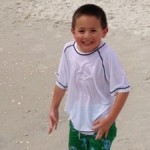 I sit on the beach, feel the sand’s angry texture rub my chemo feet in a way I wish it wouldn’t.
I sit on the beach, feel the sand’s angry texture rub my chemo feet in a way I wish it wouldn’t.
I watch my family in the ocean, turquoise and calm and vast.
My husband flips over, face in the water, takes some strokes out to sea.
His movement is graceful, effortless, just as it was the when I met him 22 years ago.
He was a sprinter on the college swim team then,
and while he laughs and says it doesn’t feel effortless anymore,
nor perhaps fast,
it does not matter.
In my mind’s eye he is that young man,
swimming fast,
joking with his team,
coming over to the stands to talk to me while chewing on the strap of his racing goggles.
I fall in love with him again every time I see him swim.
My three children float, bobbing in the ocean water.
I can feel the distance between us, it feels like a lifetime.
It is my family in the ocean floating away from me.
I see the quartet, I watch as an outsider.
I do this a lot lately.
I watch them from afar and think how it will be without me.
A new family unit.
Behind the big black sunglasses my tears stream down.
Suddenly Tristan is running from the water to me, across the sand.
He stands, dripping, face beaming.
“I just wanted to tell you I love you, Mama.”
I take his picture.
I capture the sweetness.
I grab him, hug him, feeling the cold ocean water on him, melding it to my hot skin.
I murmur to him what a sweet boy he is, that he must never lose that.
I send him back to the ocean, away, so I can cry harder.
By the time they return to shore I’ll have myself composed.
But my oldest immediately senses something amiss.
She mouths to me, “Are you okay?” and pantomimes tears rolling down her cheeks.
Yes, I nod.
I walk to the water’s edge to prove it.
October 3rd, 2014 §
 It seems like you can’t rank anguish. You shouldn’t be able to “out-suffer” someone. How do you quantify misery?
It seems like you can’t rank anguish. You shouldn’t be able to “out-suffer” someone. How do you quantify misery?
And yet, somehow we do.
“My problems are nowhere near as bad as yours are.”
“I feel terrible complaining to you about it when you are going through so much yourself.”
I hear these types of comments all the time.
I make these types of comments all the time.
Placing ourselves in a hierarchy of pain and suffering serves to ground us; no matter how bad our situation is, there’s comfort in knowing there is always someone who has it worse.
Like being on a really, really long line at the movies or at airport security, as long as there is someone behind you, it somehow seems better.
Hospitals use a pain rating scale: “On a scale of 1 to 10, how bad is your pain?” When our son Colin was in the hospital for 9 days with a ruptured appendix, they asked him to rate his pain. I was intrigued at his difficulty in answering the question. At the time he was 5 years old and didn’t understand what they wanted him to do. Colin didn’t understand the concept of comparing one level of pain to another; His abdomen hurt… that’s all he knew. He used a binary scale to assess his pain: did it hurt or not? As adults we know better: pain is not a yes-or-no question. Rather, there can be levels, ranking, quantification, and comparisons.
These mental exercises are necessary to keep us going through hard times, no matter what type. Before I got cancer, cancer was a “go-to” negative reference point. I mean, how many times had I, and everyone I know, thought or said, “I’ve got health problems, but at least it’s not cancer”?
I had done that a lot.
A benign lump needs to come out? At least it’s not cancer.
A mole needs to be removed? At least it’s not cancer.
My son has hand and neck deformities and a cyst in his spinal column? At least it’s not cancer.
Then one day it was cancer.
So what could I pacify myself with?
At least it’s not terminal.
At least they can remove the body parts the cancer is in.
At least this debilitating treatment will be temporary and I have the possibility of returning to a normal life again.
Then there was the big one: at least it’s happening to me and not my child.
And when I found out that my cancer had metastasized, I could not calm myself with those comforting refrains anymore.
Now it is terminal.
Now they can’t remove the body parts it is in.
Now the debilitating treatments are permanent and I don’t have the possibility of returning to anything close to a normal life again.
I have often said I have hated becoming anyone’s negative reference point. “At least I’m not her” people now often think of me. I always thought that meant they pitied me. I didn’t want that. But now I realize that it is okay for people to be glad they haven’t walked in my shoes– in reality, that’s what I want. I don’t want anyone to be where I have been and where I am; I’d like to be the lightning rod that keeps other people safe. But we all know it doesn’t work like that.
Denial has never worked for me.
Denial doesn’t kill cancer.
I still believe it could be worse.
I know that is true.
And so, for today, I focus on the fact that I’m not the last one on line.
On the really challenging days sometimes that knowledge is all I have.
And on those days, that knowledge is enough.
August 22nd, 2014 §
 Grow up faster,
Grow up faster,
Need me less,
Reach the sky,
Stand up tall.
Make time go,
Speed it up,
Get it done,
Don’t look back.
Hear my voice,
Feel my embrace,
Know I tried,
Look straight ahead.
Keep forging,
Thinking,
Feeling.
There is no choice,
This world is all there is,
Make it last.
Ours will be far shorter a time than it should be:
Years compressed into months, days, hours, minutes.
It will never be long enough,
It simply could never be enough time with you.
July 9th, 2014 §
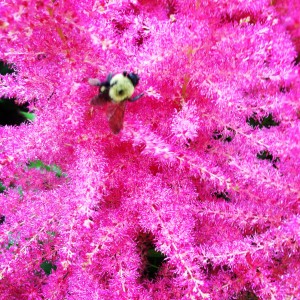 Now that all three of our children are at sleep away camp I get asked a lot “what I’m doing with all of my free time” and “what fun things I have planned.” Clearly what people think life is like for me are a bit skewed. I have nothing planned. I can’t travel and haven’t been able to take a trip for over a year. I’ve missed family celebrations, holidays, and get-togethers. I’ve eschewed visits from family and friends because I’m not well enough. What others consider “free time” is recovery from chemotherapy and struggling to do day-to-day functioning including the many medical appointments. Being able to make it out for a coffee date is a thrill and isn’t possible many days. Most of the rest of the time my “free time” is spent in bed fighting nausea or fatigue or pain or other side effects.
Now that all three of our children are at sleep away camp I get asked a lot “what I’m doing with all of my free time” and “what fun things I have planned.” Clearly what people think life is like for me are a bit skewed. I have nothing planned. I can’t travel and haven’t been able to take a trip for over a year. I’ve missed family celebrations, holidays, and get-togethers. I’ve eschewed visits from family and friends because I’m not well enough. What others consider “free time” is recovery from chemotherapy and struggling to do day-to-day functioning including the many medical appointments. Being able to make it out for a coffee date is a thrill and isn’t possible many days. Most of the rest of the time my “free time” is spent in bed fighting nausea or fatigue or pain or other side effects.
For the last few weeks my blood counts were sliding and I couldn’t do anything without huffing and puffing in a much more severe way than usual. I struggled to bend over to pick something off the floor without needing to sit down to catch my breath. My hemoglobin levels had been hovering around 8.2 for months and I pushed through but they dropped to 7.2 and by then it seemed I needed a boost to be functional. Ten days ago I received two units of red cells in a transfusion that because of some problems with the samples and testing and a five hour infusion ended up being a ten hour marathon day. It was so worth it. Red counts came up within days and I felt better starting about 24 hours after receiving the cells and that continued to increase within two to three days. My platelets were also very low at 24 but regenerated on their own (low platelets are a predictable result of this chemo regimen) and I was able to avoid a transfusion of those. This was, by the way, the first time I had ever had a blood transfusion in my life.
I had chemo yesterday: Carboplatin and Gemzar cycle #6 (that means I’ve had 6 infusions of Carboplatin and 11 of Gemzar so far). Starting now, but especially with cycle 7 and every time after that, there is a risk (reported at 27% for round 7, here is an article for anyone interested) of an anaphylactic reaction to the Carboplatin (and the other platinum-based chemotherapies like it). We are being conservative and premedicating with drugs that will hopefully help blunt or avoid this type of reaction altogether. There isn’t any reliable way to predict if it will happen to any individual patient. I did have a reaction to Taxol when I received it in the metastatic setting (after not having a reaction the first time I had 4 cycles of it seven years ago) but that is not a reliable indicator of a reaction to platinum-baed drugs.
It will be time for a scan soon I think, we are watching my tumor markers which have dropped consistently in the last few months which is fantastic but on yesterday’s test just stabilized without a drop. We’ll have to see if this is just stabilization (fine) or if this is the start of the chemo losing its effect. It is unsettling to think about losing another chemo combination that has been working, even though it’s a tough regimen to tolerate.
My voice has returned to almost normal unless I use it on the phone or talk a lot. With the kids gone I really am not talking much. I had an extra five days off chemo because my oncologist was on vacation and that allowed me to get things done I usually don’t have enough rebound time to do. The transfusion timing helped too.
 I haven’t been outside much, the humidity and heat have been too oppressive for me, but I am hopeful it will break soon. I do try to make it to the beach once a week to get a change of scenery.
I haven’t been outside much, the humidity and heat have been too oppressive for me, but I am hopeful it will break soon. I do try to make it to the beach once a week to get a change of scenery.
We will get to see the kids this weekend and I can’t wait to hug them and hear all of their stories before they go back. They love camp, always have. They look forward to it year-round and now that they all go it’s great they can share these stories and experiences (they are 15, 12, and 8. Last year the youngest begged to go for a week to try it out. We said yes, knowing his siblings would be there and he would have a blast. Five days in he called in tears, begging to stay. That repeated every week until after a month we said it was time to come home!).
Some may wonder why, at this time, I let them go instead of keeping them home with me. I do it because it’s not about me. It’s about them. It’s something they love. It’s an important routine, tradition (this is the sixth year for the oldest). In my eyes, it’s important that they have a change of scenery, freedom to be kids, get away from the ways my cancer and its chronic treatment limit what I can do, and therefore what they can do. It’s a gift I can give them and I also feel it reassures them that I am doing better than I was a few months ago. This is important.
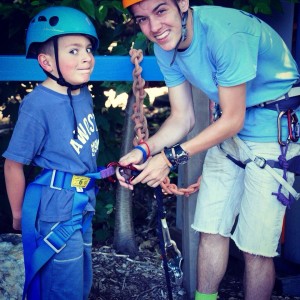 I love having them away from electronics, away from wondering if asking me to take them somewhere or do something with them will be “too much” or “bothering me” which I know the older ones are always concerned with. I want them to be with friends old and new, having fun with young and energetic counselors, trying new things. There are so many (most/all) physical activities I cannot do with them that they can do there. So many new games to play, achievements, laughs, experiences. I never hesitated when they were ready to sign up last October for this summer. I knew that no matter what, they needed and deserved it. On the left is my favorite photo from camp so far: Tristan getting hooked in to try rock wall climbing for the first time. It makes me laugh every time I look at that facial expression!
I love having them away from electronics, away from wondering if asking me to take them somewhere or do something with them will be “too much” or “bothering me” which I know the older ones are always concerned with. I want them to be with friends old and new, having fun with young and energetic counselors, trying new things. There are so many (most/all) physical activities I cannot do with them that they can do there. So many new games to play, achievements, laughs, experiences. I never hesitated when they were ready to sign up last October for this summer. I knew that no matter what, they needed and deserved it. On the left is my favorite photo from camp so far: Tristan getting hooked in to try rock wall climbing for the first time. It makes me laugh every time I look at that facial expression!
That doesn’t mean it’s easy for us to be apart. We are very close. Especially the older kids worry about me I am sure. But I stay in touch by email, will see them on visiting days, and I send them weekly care packages.
But the truth is that separation is good. It’s a selfless act for me to teach them how to to be without me. One of the most important things, in my mind. Coddling them and making them stay home is not what I feel is best for them right now. It is part of our job as parents to teach our children how to be independent, how to solve problems on their own, how to go off in the world without us for whatever reason. I will always want more time with them. It will never be enough for me. But this is my old age. I must teach them as many lessons as I can, while I can, for as long as I can. And that is true for everyone, but of course I have not only the urgency to do it NOW but also I have no idea how long I have and will likely be debilitated in some form until that time comes.
Yes, it’s true no one knows how long they have to live. But those diagnosed with a terminal disease know what is most likely to kill them. And that their time is not just going to be shortened, but consumed daily with the treatment and effects of that disease. It’s not having a normal, healthy life that is relatively good and healthy until a sudden accident happens. It’s just not the same as the general worries of growing older or aches and pains. It’s never-ending. I don’t get to count down how many chemotherapy (or other treatment) sessions until I’m done this time. Being done will mean there is nothing left for me to try. Anyone who has had chemo or radiation or some other type of therapy knows how important it is to have an endpoint, a countdown. Knowing that will never happen (and in fact what you’re really hoping for is a lot of them, because that means you still have options) is one of the mental struggles each week, since it isn’t just spending one day a week getting chemo, it’s how it makes you feel each day after that.
My hair is growing slowly back on this current combo. I know many people mistakenly think this means I’m “better.” I do like that soon I won’t be covering my head and that means I can be more invisible in public. But I also know how many comments I get on the occasions I have done it that people think I am done with chemo or all better. Not all chemotherapies cause hair to come out. My hair will come and go numerous times by the time we are done with this. Its presence or absence only indicates something about which chemo I’m on, not its success or failure.
Someone on Twitter asked for my piece on what to say and how to be a friend to someone who has cancer/serious illness. Here is a link for anyone that missed it and is interested (it’s too long to include the text in this post).
Also, I am including two posts from last year at this time. One on the eve of the kids’ departure for camp and one written while they were away. Of course I was doing even better than I am now, my thoughts were similar, but not as urgent, strong, painful as they have been the last seven months.
I’ll post again with an update if there is anything to report on change in treatment, scan results, etc. For now we stay the course which is not easy, but is the best possible choice of the options I have right now. And that’s the best I can do.
I appreciate the support, as always!
…………………………………………….
In these last remaining hours (Camp) original post here
In these last remaining hours
Before my children disappear
One,
Two,
Three…
In these last remaining hours before they go and spread their wings again,
Leave this nest,
I miss them already.
I put the dinner pots and pans away.
Wipe the crumbs from the table,
Load the dishwasher,
Play fetch with the dog.
I sit in the garden,
Listen to the wind in the trees,
The birds settling down before nightfall,
As we settle, too.
I tuck them in one last time,
Hear their doors click shut.
One,
Two,
Three.
Tomorrow night there will be no mess to clean,
No yelling upstairs that the TV has been left on again,
No trunks piled high with carefully labeled belongings in the dining room.
I will cry, I know.
Not because I am sad that they are going– no, that gives me great joy.
Children being children.
Forgetting stress at home and doing new and varied things.
I cheer their independence.
I will cry because I know they will always need me somehow and I just wish I could be there for them to outgrow
by choice,
by time,
by age.
I hear the mother bird in the tree calling out.
I don’t know to whom.
I will be like that tomorrow,
calling out,
with no child to hear.
……………………………………………………….
Like dollhouse rooms left abandoned (original post here)
Like dollhouse rooms left abandoned,
The rooms stay tidy:
Beds made tight,
Pillows square,
Hampers empty.
It’s been one week since the children left for camp.
Littlest Tristan was due back yesterday but a few days ago he said he was having so much fun he wanted to stay another week.
I realized this week that after being sick for the previous two that I needed this time to catch up, to rest, to regroup.
I miss them but am so glad they are having fun doing what they love.
I pack up care packages,
write letters,
wake in the middle of the night and mentally picture our children sleeping in cabin beds.
Our dog Lucy follows me, sleeps in my room now, not Paige’s.
She doesn’t want to be alone and stays within feet of me every moment.
I tell her it’s okay:
The kids will come back.
The rooms will get messy again.
There will be crumbs dropped at the dinner table and car rides galore.
Paige and Colin and Tristan will come back tired and dirty and happy.
They will come back.
They will.
That is the key.
I think of absence like a hole:
How different it is when it’s temporary and filled with happiness,
Rather than when that hole is a pit of grief. Of ache. Of loss.
The way it will someday be for them.
December 21st, 2013 §
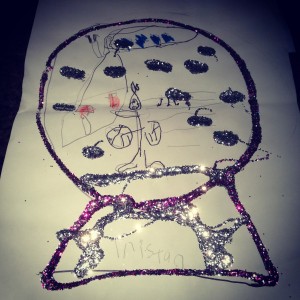 When I was growing up and there was a particularly tough day my mom would use the expression, “Mama said there’d be days like this.”
When I was growing up and there was a particularly tough day my mom would use the expression, “Mama said there’d be days like this.”
Yesterday was one of those days.
My husband and I left the house before dawn. At about 8 AM I started my appointments. First was a physical exam with vitals taken and a review of symptoms. I met a new oncologist who was filling in while so many of the doctors were away (Friday of a holiday getaway week). We arranged this match because she is the Principal Investigator on a new clinical trial the team has been discussing as a good fit for me. As regular readers know, in my last post I explained that my cancer has progressed in some spots (stable in others) so we need to try to find something better now.
We reviewed my scan results and what she and my regular onocologist think we should do next. A slot in a new trial opened this week and it seems to be a reasonable next step to try another non-chemotherapy method. I’m going to save the details of that study for a later post but for those of you who know and understand the jargon, this one involves a Novartis drug called LEE-011 which is a CDK 4/6 inhibitor in combination with an anti-hormonal agent. This clinical trial is what I’m signing up for next.
The protocol for this drug is very challenging. It involves many trips to the city, especially in the first month where it will be once or twice a week, sometimes just for a blood draw. Some of those visits will be 8 hour sessions where blood is taken a few times to check drug levels in the blood before and after taking the pills. None of the blood draws can be done near my house since the conditions and testing all must be carefully controlled as part of the study. I’ll enumerate side effects and other details in a later post but this one looks to affect me more in daily functioning than I’ve had to deal with in the last few months. I’m definitely nervous.
We talked for a long time about the study. I had already gotten word from my oncologist about her own recommendation. I signed consent forms. I scheduled the necessary tests. They require a CT scan (I just did one, though it falls 2 days outside the testing window. We should be able to get an exemption for that so that I don’t need to redo it). I will need a PET scan, likely need a repeat bone scan, an echocardiogram (this drug can have cardiac side effects), an electrocardiogram, blood test, urine test and, (rats!) a liver biopsy. All of these must be completed in the next two weeks during my “washout period” (interval of time where you are not taking any chemotherapy agents and so you are starting with a clean slate to measure effects in a new clinical trial). Of course, the holidays are not an easy time to accomplish all of these.
I then went to get chest x-rays to monitor my pleural effusion (fluid in the sac around my lungs that makes breathing difficult). After those x-rays and fasting until almost noon I had 40 minutes to finally grab a quick bite. Then I went to the main hospital to meet with a pulmonary physician to decide what to do about the pleural effusion and find out how bad it actually is.
I had a full medical history and symptom assessment with a nurse and then met my new pulmonary doctor. He told me that my left lung is compressed to about 50% of its usual size from the fluid that is there. He estimated 1.5 liters of fluid have accumulated. He said it “layered” on x-ray which means it’s still flowing and therefore would be easier to extract. We decided to do a procedure called a thoracentesis to drain it. One of my morning blood tests that had to do with clotting had come back high, something that would mean we couldn’t do the test. We figured out it had been drawn from my port, which should never be done for clotting tests because they use an anti-clotting liquid called Heparin to flush the port each time and that would lead to inaccurate results.
Through a lab snafu it took 2.5 hours to get the new results rather than 40 minutes. By the time we finally had the all-clear to proceed it was about 5 PM. I still had barely eaten or had anything to drink. For the draining they sit you on a table with your feet dangling and have you bend over a stand for support. It is very much like having an epidural placed. They use local anesthetic to numb the skin and then stick a needle between your ribs, insert a catheter and vacuum extract the fluid (which should take about 10-15 minutes). The doctor got the catheter in, got a small sample of fluid going and…
My blood pressure plummeted. My heart rate dropped. I got hot and woozy and clammy. Yup, I passed out. They had to remove the drain and get me on oxygen and lay me down. I revived quickly, but we could not continue. So, I have the pain from the needle in my back but nothing to show for it. I will now have to go back on Christmas Eve to try again (fully hydrated and fed, hopefully this will be the key). I was obviously disappointed and emotional by this point. I had to go get the X-ray you need to confirm that no damage was done by the needle, and we made a train that got us home at 8 PM. It was a long exhausting day without too much to show for it in terms of relief.
It’s hard not to feel defeated on some of these long days when it just seems the mountain is so big to climb. Right now we are making a change to try to get better results in controlling cancer progression. I won’t be able to to travel for the holidays anyway, but now I will be spending time in hospitals rather than resting at home and taking a break. Cancer doesn’t give a damn about Christmas. Or families. Or anything that matters to me. But my doctors do. And they continue to show caring and concern and work so hard to try to make things better. Without that help and support this would be so much harder. Even when mistakes happen (and yesterday there were quite a few with blood draws and lab tests and so on), every doctor apologized. I definitely shed tears many times yesterday out of frustration, which doesn’t happen too often.
As I waited for my results I watched the office staff exchanging gifts, talking about holiday parties and Christmas cookies. One by one they packed up their belongings and turned out the desk lights. I was the last patient left in that department. That was hard. But I also know that I got to walk out of the hospital last night. I still got to go home and sleep in my own bed. And when I got home I made it just in time to hug my children and see Tristan’s artwork, all sparkly and smile-inducing. He asked me at bedtime why I couldn’t go on vacation with the rest of the family again this year. I explained to him that altitude makes it harder for me to breathe. The air is thin, and I would not feel well. I asked if he understood. “Yes, but I am still sad you can’t come.” “Me too, honey. Me too.”
I’m going to need to dig deep over the next 6 weeks. I’m going to need to ask for help with child care and logistics while I’m recovering from procedures and having so many trips to Sloan-Kettering. That’s not easy either. I find it very hard when I feel that I’ve not been strong enough, or that I’ve complained about the way a hard day has gone. I know it’s normal to need to just cry and complain and say to the cold night-time sky, “This isn’t fair. This isn’t how it is supposed to be.” Sometimes you just need to vent, though.
I need to be strong for the next few days and what they will bring. I want to make the holidays joyous for my family to the degree I can. These are the tasks that make me feel like me. The family shopping is done, the teachers’ gifts distributed, the tips for those who help during the year have been handed out, the holiday cards sent. These are the things that I know I could get a “pass” on. But they are the things I value. I will always try to show my gratitude to others.
Yes, Mama said there’d be days like this. But tomorrow is another day. And I don’t lose hope that it will be better.
April 2nd, 2013 §
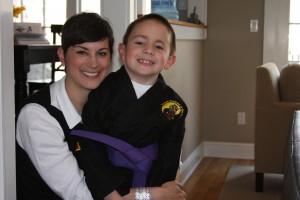 It’s been a wonderful but long few days. I was so run down yesterday that after our egg hunt I got into bed and pretty much didn’t get out for 9 hours. Tristan’s birthday was absolutely delightful. We held a birthday party, something he’s never had before. We’re not big on parties in our family; instead, we always have small family celebrations.
It’s been a wonderful but long few days. I was so run down yesterday that after our egg hunt I got into bed and pretty much didn’t get out for 9 hours. Tristan’s birthday was absolutely delightful. We held a birthday party, something he’s never had before. We’re not big on parties in our family; instead, we always have small family celebrations.
One year, Tristan was at Shriners Hospital for Children on his birthday having hand reconstruction surgery. When the surgeon you want has an opening in his schedule, you don’t say no because it’s your four year-old’s birthday.
When we’ve done parties it’s been my tradition to have a no-presents party. Our children get presents from us and close friends. Party guests, however, are not allowed to bring them (it’s fascinating to me how many people have a difficult time following this rule). Instead, they’re asked to bring the money they would have spent on a gift and donate it to charity (we designate Shriners Hospital for Children). Each party we’ve had in the past has raised at least $500. Paige has had two or three parties through the years, Colin has had two. In those particular years they got the party, cake, and presents from family members. This was more than enough.
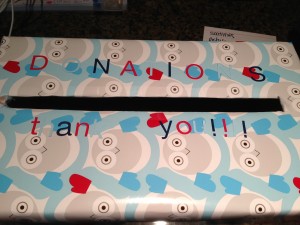 We put a donation box out at the party and everyone can stuff the box. This year Paige wrapped and decorated the shoebox. The children who are bringing the donations also get a lesson in the joy of giving to others. Often the parents tell me that their children don’t understand why they can’t bring a present. That’s okay with me, I think it’s fine to force a discussion about giving to those in need. My children take pride in doing something good, and even when they are young and want to know why guests can’t bring gifts, I feel no guilt in explaining that not all children can afford to pay for the operations they need. When parents say to me, “Oh, I would love to do that but I don’t know how my child would respond,” I never quite understand that. It’s our jobs as parents to be role models, to show our children what’s important.
We put a donation box out at the party and everyone can stuff the box. This year Paige wrapped and decorated the shoebox. The children who are bringing the donations also get a lesson in the joy of giving to others. Often the parents tell me that their children don’t understand why they can’t bring a present. That’s okay with me, I think it’s fine to force a discussion about giving to those in need. My children take pride in doing something good, and even when they are young and want to know why guests can’t bring gifts, I feel no guilt in explaining that not all children can afford to pay for the operations they need. When parents say to me, “Oh, I would love to do that but I don’t know how my child would respond,” I never quite understand that. It’s our jobs as parents to be role models, to show our children what’s important.
When I had my own 40th birthday party a few years ago I did the same thing I have my children do: I asked guests to bring donations to charity in place of a gift. We must be willing to do ourselves what we ask of our children.
Shriners Hospitals provides care regardless of financial situation with an emphasis on orthopaedic care, spinal cord injuries, and burns. Tristan’s complex hand reconstruction helped him tremendously, he was able to have 3 procedures at the same time (a tendon transfer, a z-plasty to widen the web space, and a ligament tightening at the base of his thumb). Should he need cervical fusion surgery for the hemivertebrae and malformations in his neck that is where we will go (I’ve written elsewhere about Tristan’s congenital deformities in his spine and left hand). The team in Philadelphia including Dr. Randal Betz, Dr. Scott Kozin and physician’s assistant extraordinaire Janet Cerrone are very special to us.
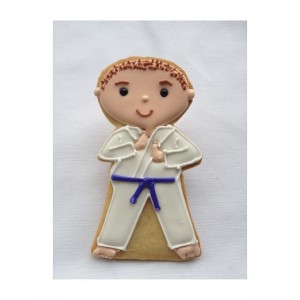 Invitations and stickers from Easton Place Designs and the most adorable cookies from One Tough Cookie helped to make the day special. Tristan loved his karate party, and I love that I’ll be sending a big envelope to Shriners Hospital in Philadelphia from Tristan. I am so grateful to the families who helped to make this birthday so special for Tristan. I thank them on behalf of the children who will benefit from their generosity. Everyone does what’s right for them. This type of birthday celebration is what feels right to me.
Invitations and stickers from Easton Place Designs and the most adorable cookies from One Tough Cookie helped to make the day special. Tristan loved his karate party, and I love that I’ll be sending a big envelope to Shriners Hospital in Philadelphia from Tristan. I am so grateful to the families who helped to make this birthday so special for Tristan. I thank them on behalf of the children who will benefit from their generosity. Everyone does what’s right for them. This type of birthday celebration is what feels right to me.
…………………………………………………….
In case you missed it, Seth Mnookin had a great piece on Slate about the Time magazine cover about cancer. He and I had a great talk about this and I’m quoted briefly in the piece. You can read it here.
** Also, a reminder I’ll be on Doctor Radio (SiriusXM channel 81) this Wednesday, April 3rd at 1 PM EST on the Oncology Show. You can check the schedule here, and it does repeat a few times during the week. I am going to try to get an audio file for those of you interested in listening who won’t have access to it live. The topic? One of the most popular here on the blog: how to talk to people with cancer in a sensitive and caring way.
March 22nd, 2013 §
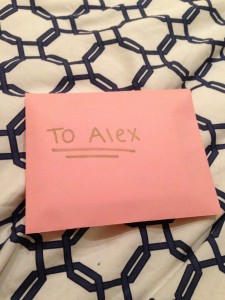 The moving truck has been in their driveway all day.
The moving truck has been in their driveway all day.
Six year old Tristan came sobbing to my bedroom a little while ago.
“The truck is in their driveway. My best friend is moving. I am so sad. I’m so very sad.”
I brought him into my bed and held him as he cried, hiccuping and shaking and hanging his head.
“I know you are sad,” I told him. “I’m sad they are leaving too.”
I told Tristan that he will still see Alex again before he leaves. He can write Alex a letter before he goes and we’ll be able to call him and even FaceTime him too.
I told Tristan I know it is hard when you have a friend leave you. I explained that what he is feeling means he loves Alex a lot.
I was crying too, tears running down my cheeks onto his shirt. I was crying for his pain over having a friend move away but I confess that’s not all I was crying about.
Tristan doesn’t fully understand why this hurts me so much.
I hurt because I can’t stand the thought of it…
I cannot help but wonder: if this is how he feels when a friend moves away, how will he cope when I go away forever?
I know my family will accept my death. There is no other way. But the fact I have to spend my days thinking about these things tears me apart.
I know the impact of the death of a parent is everlasting.
I know it is something you deal with but never get over.
I hate that I will do this to my children.
I hate that I cannot ever fully have this out of my mind.
I hate cancer.
But I love my family more.
Tristan, I’m doing everything I can to make that horrible day as far from now as I can. I don’t want to die and leave you, or Colin, or Paige, or Daddy, or Nana, or Grandpa, or Uncle Mark. I don’t want to leave my friends. I don’t want this life to end, and certainly not so soon.
But when that day happens and I do die, it is more than just about being what I want.
Not everything is in my control. If it were, we wouldn’t be where we are now. Trust me.
Wanting my life to be long, wishing for it, hoping for it… these things just aren’t enough.
Cell biology and tumor features and available treatments will have more to do with the length of the rest of my life than any wishes or hopes or dreams.
But I’ll still keep those wishes and hopes and dreams, sweetheart, because I won’t give up on you.
October 24th, 2012 §
To my dearest children,
Someday you will understand the depth of my love for you. Perhaps it might take until you are adults, perhaps made more vivid if you are fortunate enough to have children of your own. No matter when, no matter how, I hope you will someday learn this powerful emotion I feel for you. You give me strength. You make me fight. You give me joy. You make my heart swell with pride.
I want to see it all. I want to see every day. I want to know every phase of your lives.
You see, I am a quitter.
I know, those of you who know me are probably chuckling and saying, “Yeah, right.”
It’s true.
There are very few things I’ve finished that I have started. I think I was always afraid of not doing something well. I would start and quit… or just not start at all.
But let that be a lesson: there is no such thing as perfect. Try. Fail. It’s okay. Take a chance. You have no idea where it might lead.
Hard work doesn’t always pay off. People don’t always get what they deserve. That’s just the way it goes.
I didn’t finish my Ph.D.
I never wrote a book.
But my darlings, let me tell you something I take pride in: you. Parenthood is a lifelong commitment. There is no backing out, changing your mind, saying “it’s too much.”
There is one job I’m good at and it’s being your mom (I’m a pretty good wife but I do tend to nag even though it’s for your dad’s own good). Your flaws and your talents make my heart soar in equal measure… they are what make you you. You are each so different, so unbelievably deliciously divine in your own way. Never doubt that my heart bursts every time I look at each of you. I’m pouring every ounce of love into you that I can. I’m going to just keep doing it every day.
Being your mom is the best thing there is.
October 9th, 2011 §
Last Wednesday we took Tristan to Shriners Hospital for his checkup with his spine and hand team. He goes every 6 months for monitoring, in particular to make sure the tilt of his head has not increased. His spinal deformity consists of hemivertebrae (vertebrae that are only partially formed) and vertebral fusions (ones that are stuck together). This combination results in his case in something known as a disorganized spine.
As an infant his head was quite crooked on his neck.
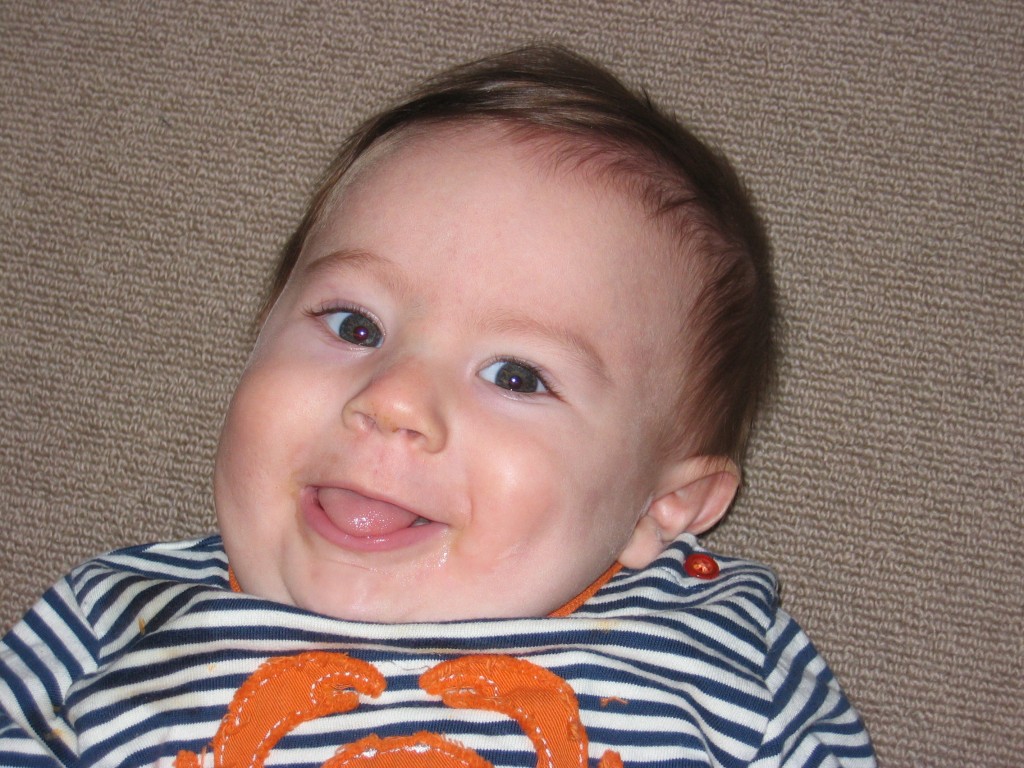
During the ensuing months, the tilt measured 25-30 degrees. The severity of the situation increased and Dr. Randal Betz told us if the curve progressed we would have to intervene with surgery to fuse the vertebrae in a straight position. His neck growth would be halted; while his body would mature his neck size would be that of a toddler. He would have no mobility in the neck after the surgery. We prepared ourselves for hearing the news.
We continued to monitor his growth. As he began to sit, and then walk we watched as the neck grew. His two hemivertebrae were growing in such a way that they were balancing each other as he grew. Had the pizza slice-shaped wedges been wide on the same side, surgery would have been inevitable. Because they were on opposite sides, this “z-curve” worked to his advantage. By the time he was a toddler his head was straighter.
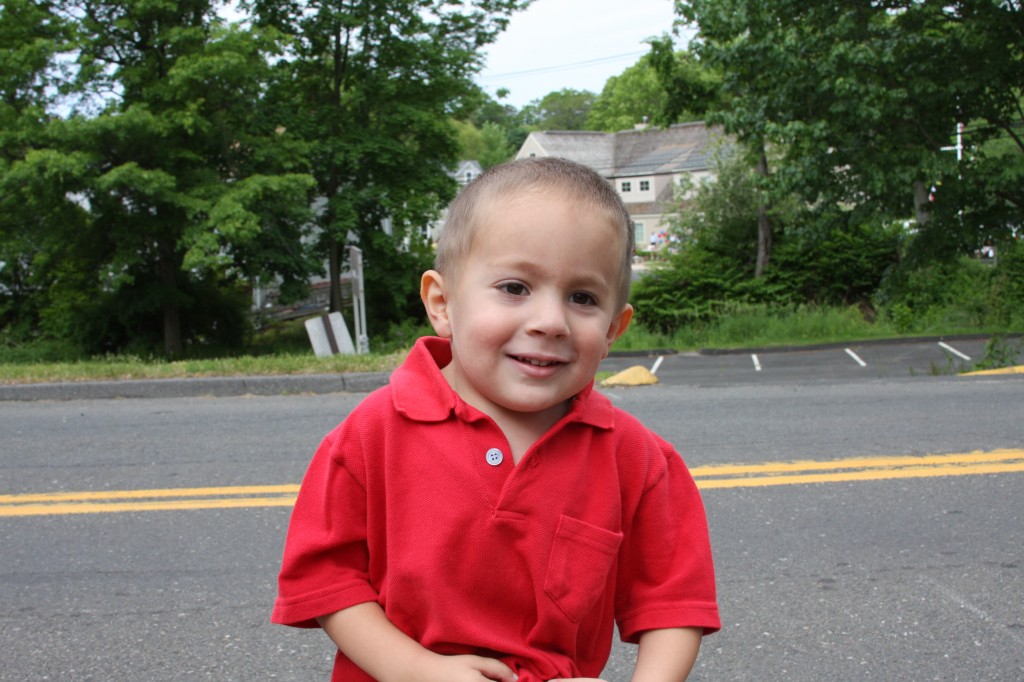
Though his neck is short, and always will be, it has continued to grow. Physical therapy since birth has kept his muscles stretched and strong. Weakness on one side of his body is imperceptible.
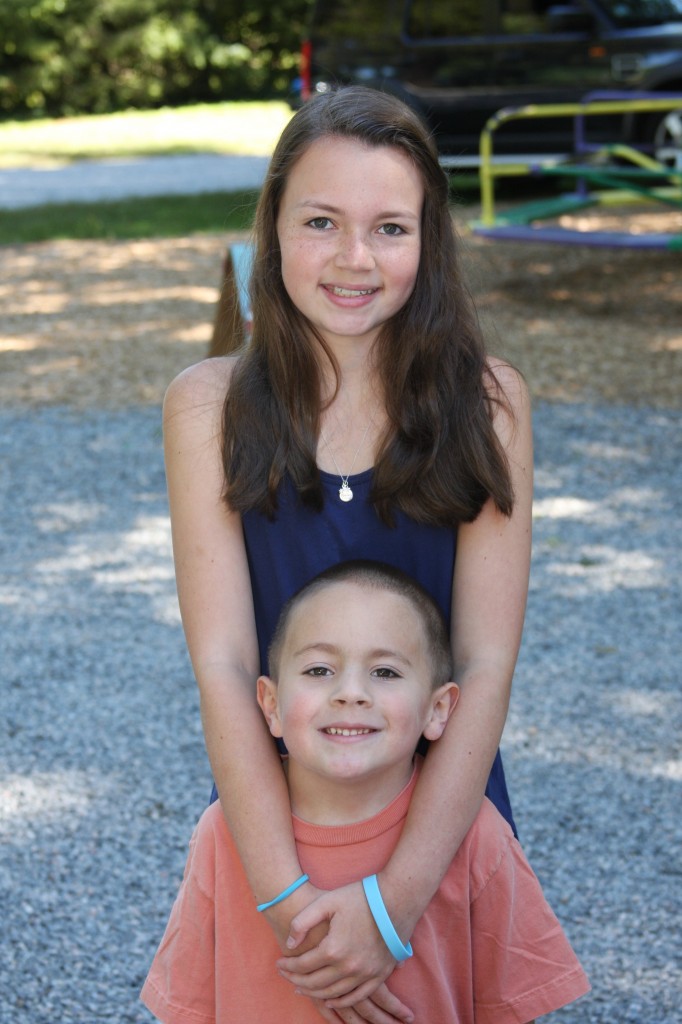
This week his x-rays showed that the tilt once at 25-30 degrees is now less than 8 degrees. His eye sockets and lower jaw are almost even. The three points he has mobility in his neck are stable and should be sufficient to prevent extraordinary wear. He’s doing as well as he possibly can be, given his anatomical issues.
We next had Tristan’s appointment with his hand surgeon. He, too, was pleased with the results of Tristan’s three-pronged surgery last March (you can read about Tristan’s hand deformities here including his lack of a flexor pollicus longus muscle on his left side which makes his thumb unable to bend ). A flexor digitorum superficialis tendon transfer, ulnar collateral ligament reconstruction at the base of the thumb, and a 4 flap z-plasty of the thumb index web space were all successful. The large scar on his wrist is fading and it’s hard to believe it looked like this.
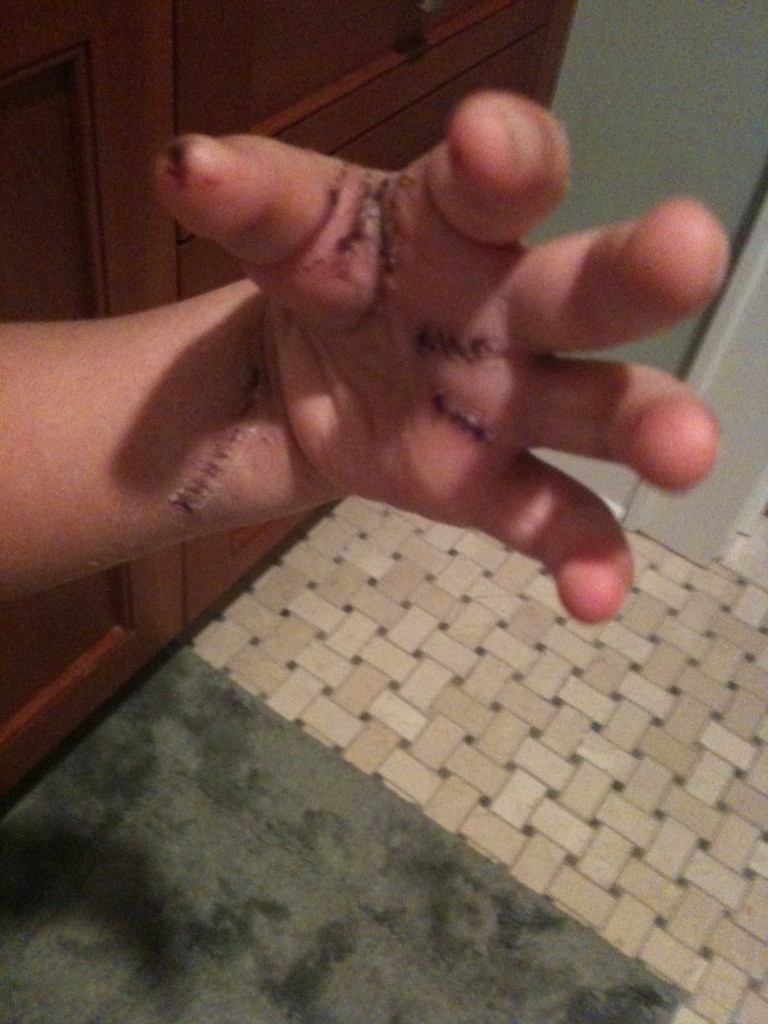
Here he was this week showing that hand with his upper extremity surgeon, Dr. Scott Kozin.
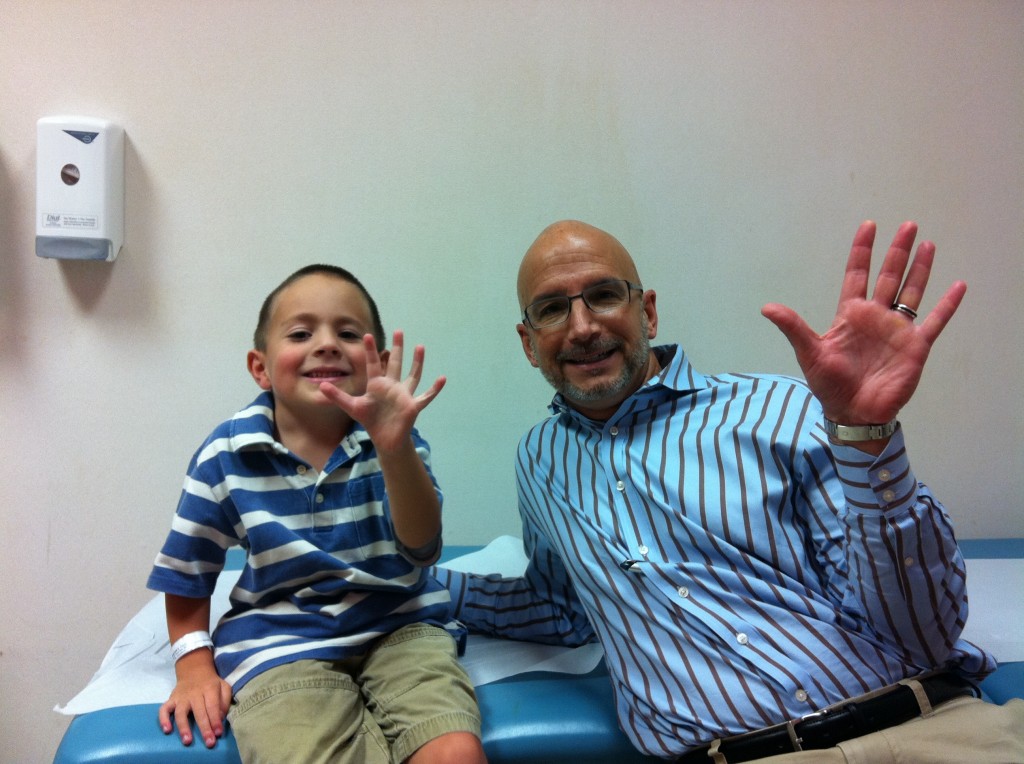
His left thumb will never bend, and the hand will be weaker because of it. He is a lefty, so it does affect his fine motor skills. But we continue to do hand therapy with him and it’s made a world of difference. Each Monday and Tuesday this 5 year-old is doing his therapy sessions at 6:30 A.M. before he heads off to kindergarten. That smile is always on his face. He never complains. He got a great report and we left Shriners happy and exhaling for another six months. We saw many friends there and it’s always like a family reunion. We’ve been through a lot together and we are grateful for their continued support and care.
I do want to mention one thing we learned at this visit. Shriners specializes in orthopaedic and spinal cord injuries; when children have traumatic spinal injuries, this is where they go. Tristan’s spinal surgeon told us there are two activities that they recommend children avoid because the risk of spinal injury is so great (this is for all children, even who do not have any defects): trampolining and riding four wheelers (ATVs). Those two activities have such a rate of injury that the surgeon does not allow his own children to participate in them. I share that information because it was new to me; we do not own either piece of equipment because Tristan is not allowed to do either but we were not aware that those activities were so dangerous to all children.
September 6th, 2011 §
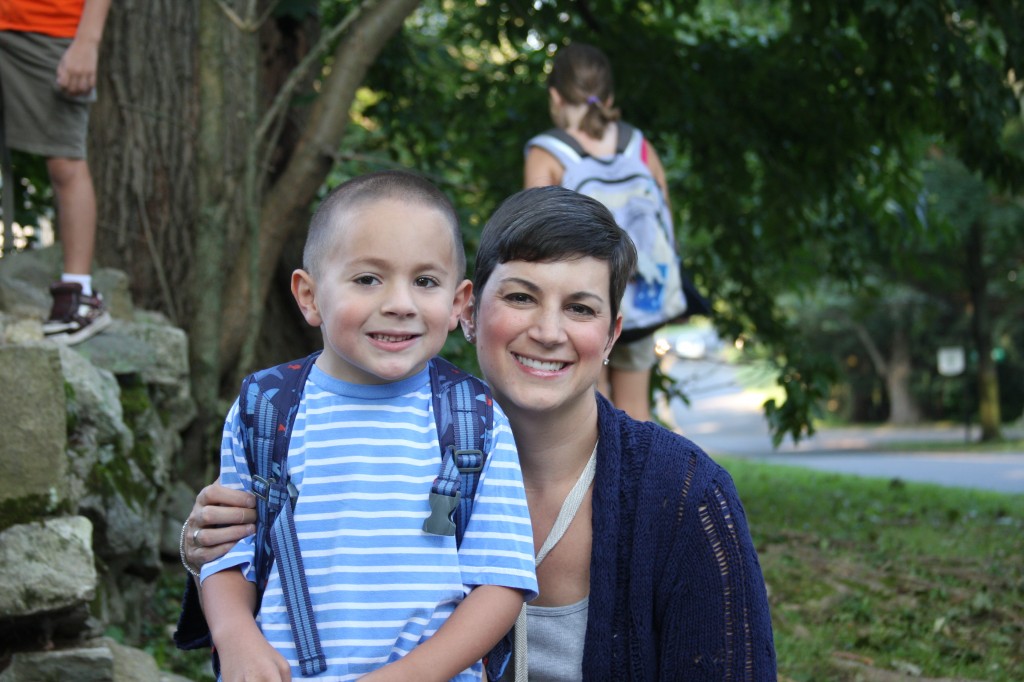
The house is so quiet… for the first time ever, all three of my children are out the door before 8:00. Tristan will have half days of kindergarten for the first two weeks so the change from preschool won’t be too dramatic. And yet, somehow with his backpack on, lunch pack clipped to it, it is different. He stands at the bus stop with a bunch of other children from the street; some of them were babies when we first moved here seven years ago. I see the changes in them after the summer more easily than in my own.
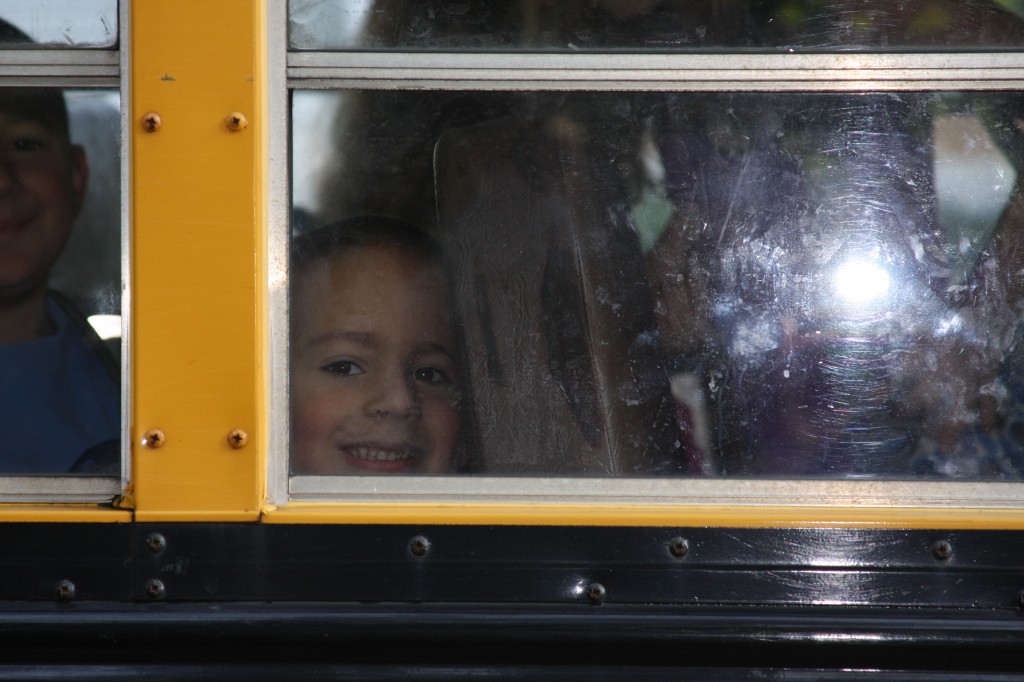
These are the psychological stretch marks I’ve written about before. These are the moments you know are monumental. Growth happens in fits and starts, not with smooth, sliding grace. This shift is simultaneously sudden and gradual in its arrival; I’ve been counting the days for the last month, but still the finality of its presence takes my breath away. With Tristan it’s different, his life thus far has been a challenge in many ways (background on Tristan and his physical abnormalities here). We’ve been a team, and worked so hard together. He will continue with OT and PT and need a few modifications in the classroom. But I know he’s going to be just fine.
I’m looking forward to writing again… the last month has been busy with things mostly of the unpleasant kind. But the routine of the fall, the schedules, the calendars give me structure. And with structure comes comfort. I can get through this rocky time. I can create the life I want, the one I need. I just have to keep trying.
March 9th, 2011 §
When Tristan started to speak he didn’t call me “Mom.”
Or “Mama.”
Or anything like it.
Instead, he called me Cutie.
At first we laughed. And corrected him. But he was persistent: my name was Cutie. I had called him that often… he was mirroring back what he heard. It warmed my heart every time he said it; after a few times I stopped correcting him.
I could hear him in the house calling, “Where’s Cutie?” and it made me chuckle. In public, of course, it was priceless. “Where’d Cutie go? There she is! Cutie!”
One summer we hired a college student to babysit for the summer. She, too, got on the bandwagon. When referring to me, it was always Cutie.
While at the beach that year, we found a keychain that had “Cutie” on it. I bought it, and stuck it on my key fob.
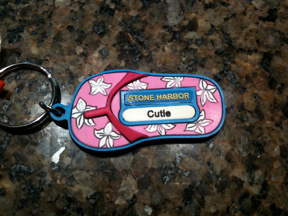
A few months later when my car was broken into, the key ring was stolen. I have to admit, after the initial embarrassment of telling the young policeman that “Yes, I did have a distinctive keychain, and it was a flip flop that said ‘Cutie’ on it,” I was sad that this souvenir was gone.
Days later, the robber’s loot was found. I went to the police station to see if any of my belongings were there. My CD’s were gone. The sunglasses too. Almost nothing from any of the cars he’d taken things from had been recovered. But there, on the small folding table in the room at the police station was my keychain.
I was so glad to have it back. Somehow it was a really important trinket to me. By the time it was recovered Tristan was already starting to call me “Mommy.”
Interestingly, when he sees photos of us together from those years, including every single one from the photo session in black and white, he says, “There’s Cutie!”
I guess those years were as important to him as they were to me.
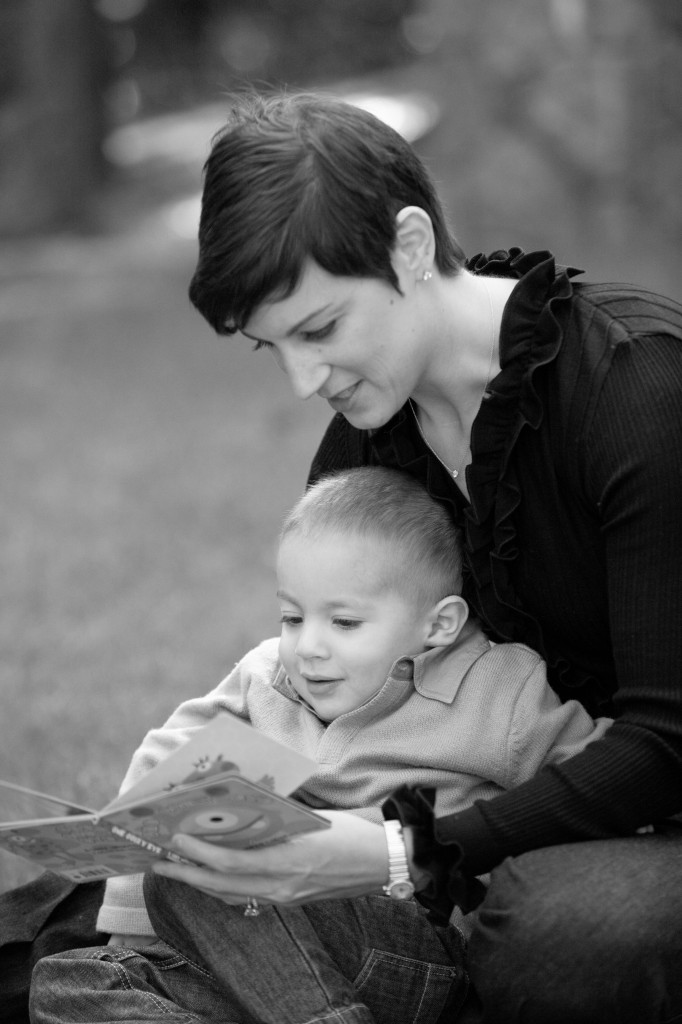
Written 4.28.2010
February 14th, 2011 §
Today I’m doing a follow-up to a piece I wrote last year. At Tristan’s preschool Valentine’s Day celebration last year he received loads of Valentines; one by his friend Bennett was beautifully written. At this time last year Tristan hadn’t had his tendon transfer surgery yet (you can read more about that here). He wouldn’t hold a pencil, had never colored or played with Play-Doh. He’d never written his name. I longed for the day that would happen, and in that way it usually does, I couldn’t imagine a future where he would write. It often seems when you’re in the worst of a situation, try as you might, you can’t picture a way out, or see that things will ever change. But I had hope, and belief in the surgeon who felt that the 3-pronged approach to making Tristan’s hand work better would help. I always have confidence in the resilience of children. If they want to do something, they will find a way.
Tristan did start writing. It’s neither fun nor easy for him. Cutting, pasting, drawing, writing, zippering… all of these things are a challenge. He’s miles away from having the dexterity to button. But with the help of physical therapists he’s making lots of progress. Three times a week he works on these skills now that his surgery and recovery period are over. His letters are jerky, and crooked. Some are backwards in the way that many 4 year-olds do. Markers are better; he doesn’t have to push so hard on them to make a line on the paper.
The letters may be crooked, so is his little smile. They’re beautiful to me. I know he had to concentrate and work very hard to write this well… this is the Valentine Tristan brought home to me on Friday:
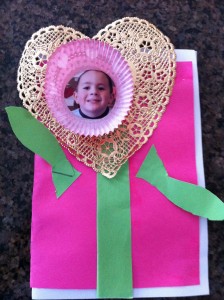
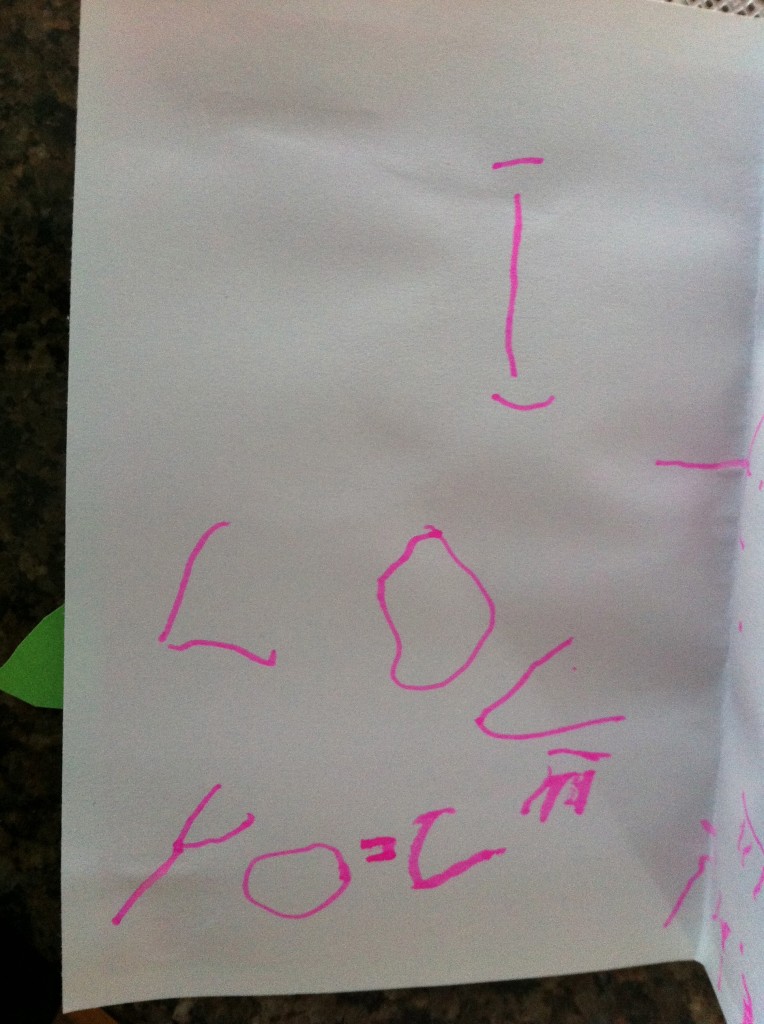
This is the one I’ve been waiting for.
It’s going in my memory box. For always.
………………………………………………..
if you missed it, this was last year’s Valentine’s post:
Tristan’s Valentine
My son Tristan is about to turn 4. I haven’t written about him much here. I started thinking about why that is, given that his life has given us more twists and turns than either of our other children. I think it’s precisely because he’s had his share of hardships that I have felt overprotective of him. But it really needn’t be that way.
Tristan’s physical problems are a bit unusual. For those of you who don’t know him, he had open heart surgery at seven months old to move an artery that was compressing his trachea, preventing him from breathing properly since the time he was born. He required feeding therapy to learn to eat after having trouble combining eating and breathing until that point.
He also had problems with his neck. From birth his head sat at an awkward angle. Doctors thought it was muscular torticollis that could be fixed with physical therapy. We did a DOC band to correct the flattened head he had as a result of this “fixed” neck position. But after a while my intuition told me it wasn’t muscular. I felt it was orthopedic, something that would be an extremely rare abnormality. I took him to an orthopedic surgeon who confirmed our fear: Tristan’s problems were more serious than just a tightened muscle.
We were told various diagnoses for his problems when he was about six months old– everything from cerebral palsy to Goldenhar Syndrome. But in the end, when pressed for a diagnosis they jokingly say he has “Tristan Adams Syndrome,” a combination of rare defects in his spine and hands.
The cervical vertebrae in his neck are not formed correctly. Half-formed, or fused together, the vertebrae near the base of his brain are mangled, appearing on x-rays, CT scans, and MRIs almost indistinguishable from one another. His adorable exterior hides a jigsaw puzzle-like appearance on the inside.
While the abnormal vertebrae caused him a severe head tilt to one side as an infant, it now appears from the outside as almost straight. As he’s grown his “z-curve” (two striking jogs in his neck which have thus far balanced eachother out; either one alone would have required surgical intervention already) has improved with growth.
We watch, we test, we monitor. If the congenital scoliosis (meaning a curvature of the spine since birth) worsens, he’ll need surgery to fuse his neck in a fixed state with rods and screws. His neck would not grow any more, and he’d have no mobility in it. Imagine having your neck in a position where it’s extremely short and you can’t turn it at all unless your whole upper body goes with it forever. So far, we’ve escaped this. But we are told that every growth spurt brings risk.
His other oddity are his hands. For the first year of his life we knew something was wrong, but no one could figure out what. He held his hands oddly. His thumbs just looked wrong– more like big toes. And finally, a hand surgeon was able to tell us: he has hypoplastic (underdeveloped) thumbs. He’s missing the muscle at the base of the thumb where the base of the thumb joins the wrist. I had never heard of that before. Likely, you haven’t either. That’s why no one could pick up on it. What does this mean? Functionally, it means his left thumb can’t bend at all. Try to pick something up holding your thumb out straight. Or hold a pencil, write your name. His right thumb bends slightly, but not “normally.” Oh, and yes, of course… he’s a lefty.
He doesn’t like to do things with his hands. He won’t write or draw. He can hold a spoon and fork, but prefers to eat with his hands.
Tristan’s surgeon says around now is a good time to do surgery to help get a bit more function in his left hand. By taking a tendon from another finger on his left hand and transplanting it to Tristan’s thumb, they hope to give him better mobility. It won’t allow him to bend his thumb. There isn’t a surgery that can do this: the muscle and tendon you use for this run all the way up to your elbow (who knew?!).
As I type this I know, looking at my thumbs while I type, that computers will be his saving grace. My thumbs stay straight when I type, and I am sure that he will learn quickly how to type and use a keyboard. He copies Paige and tries to play the piano. I think he might be able to do that too.
I remind myself about the documentaries I’ve seen over the years about people with different disabilities and how they’ve compensated. The YouTube video of the mom without arms who could change a diaper with her feet was one of the most amazing.
I know Tristan’s amazing spirit, his infectious giggle, his sweet and expressive face, his stubborn tenacity will get him through. I know he falls behind on every fine-motor skill evaluation. I know he won’t be able to play many sports well because of his hands or participate in lots of sports or fun activities because of the risk of neck injury.
When he brought home his valentines from school yesterday, his friend Bennett had written his name beautifully on the red paper. Tristan can’t write a letter. He knows them all, but he can’t write them.
My eyes teared up, jealous at the inscription.
I know he’s not going to do that anytime soon.
But I also know that somehow he will.
Someday he will.
And when he does,
that valentine with his name and mine
will go into my special box of keepsakes.
For always.
December 20th, 2010 §
Originally posted March 11, 2010 on www.lisabonchekadams.com
In the wee hours of the morning yesterday I gently nudged Tristan from his deep slumber. At 5:15 we were in the car, headed out for the 2.5 hour drive to Philadelphia’s Shriners Hospital to see his hand surgeon.
These trips are always big ones to me. In the first two years of Tristan’s life we focused on his neck problems. With most of his cervical vertebrae only half-formed or fused together, we knew that we’d be told at these visits whether the curvature in his neck had worsened. At one point we were right on the border of intervention. He’d reached the maximum degree tilt of his head; if it went any more, he’d have needed surgery to insert rods and fuse his vertebrae together to straighten the neck permanently. It would have been big.
To us.
But whenever we go to Shriners we see other kids with orthopedic issues. Some are very serious. The most serious. Because the hospital specializes in pediatric orthopedic problems it is a magnet for complicated cases.
It is always humbling to walk into Shriners. Literally to walk in. Many, many children are wheeled into the hospital, unable to walk. A little baby lay in her car seat without any visible problem. But I knew that her sheep-covered blanket hid an abnormality that had brought anxious parents here.
Tristan had his pre-op appointment. He loves his surgeon; Dr. Kozin has an amazing bedside manner and got right into a great chat with Tristan when my son boldly announced as the doctor walked in, “I burped! And then I shivered!” Gee, I was so proud.
We got all of the details about Tristan’s tendon transfer surgery at the end of the month. Because we didn’t need to see his spinal team or get any x-rays, we were able to be back on the road by 10:15 to come home.
Before we left I stopped at the soda machine. I let Tristan put the money in and press the Diet Coke button. A little boy approached and his father hovered behind, watching him.
“What’s wrong with your son?” he said in that way that people who wait in waiting rooms together say.
“He’s got problems in his neck and thumbs.”
The father announced, “Our son has 7 fingers.”
I looked down, expecting to see 7 fingers on one hand. Instead, he had a perfectly-formed left hand, but his right hand was crab-like, with a thumb and a pinkie, but nothing in between but a wide expanse. “He can do everything with it,” the father said, gesturing at the hand.
He was beaming. Beaming. He was so proud of his son, about 3 years old. And he should have been. While some people might have been sad, or ashamed, this father delighted in his son’s accomplishments and accommodations to his physical abnormality.
Children are so resilient: I say it all the time. My son has taught me so much, made me more observant, more aware of life in so many ways. I am thrilled that the most horrific diagnoses and prognoses we were told about his mental development did not come true. His problems are only physical.
Last night, my Twitter friend Kathleen said that a pediatrician had told her, “Kids think about the things they can do, not what they can’t.” I loved that. It’s true. When kids realize the things they can’t do, their concern is only to find a new way to do that same thing.
I love the folks at Shriners Hospitals. They do amazing work in their network of hospitals for orthopedic, spinal cord, and burn injuries on children. They do not take any money from patients for any services they provide. If they accept your case (judged only on the specific problem your child has, and whether they are uniquely suited to help fix the problem, not on economic status) you will never pay a cent for services. I can’t ever resist giving a plug for them because we appreciate their care so much.
We were lost and scared and seeking information when we found out about Tristan’s problems. We’d never heard of spinal fusion surgery and had no clue what we might be in for. To have a surgeon say, “I know what the problem is. I have seen other children with this. If it needs to be fixed I know how to fix it.” Well, those are the words you hang on to as a parent.
In the car on the drive home it hit me how tired I was. I nodded off while Clarke drove and heard Tristan saying, “I want to go back to see Dr. Kozin.”
That’s music to my ears. His ability to be in and out of hospitals, doctors’ offices, and deal well with anesthesia will all help him in his life. With a heart surgeon as a father, and surgeries myself that started at age 5, I’ve never known a time I haven’t been comfortable in hospitals. When I got cancer it served me well.
I wish Tristan hadn’t had these problems, but he does. This is his life. The more comfort I can instill in him about medical care, the better. I think it’s a wonderful life skill to have.
So we have a few weeks until the hand surgery… and then Tristan will get his wish and get to see his surgeon again. We’ll see how he feels about him afterwards…
(to read the next few chapters in Tristan’s hand surgery story please click here)
………………………………………………………………………………..
Original comments appear below
March 11, 2010
7 comments
Stonecutter099
I do a regular search for items on Twitter related to Shriners and by doing so came across your post about “Walking in, Walking Out”.
Thanks for posting this on your blog. I am a Shriner in Edmonton, Alberta, Canada. Posting stuff like this helps to keep Shriners active – knowing that there’s actual people out there with names, instead of being fed stats that the hospitals helped X amount of children last year and spent X amount of dollars. If they actually get to see the progress that you’ve documented, it means much more.
Hope you don’t mind – I’m now one of your twitter followers.
Thursday, March 11, 2010 – 03:17 PM
Sarah
Tristan is an amazingly strong boy. It obviously runs in the family!
Thursday, March 11, 2010 – 04:06 PM
cay0730
I love these posts about your family. As a childless 40ish person, I love this inner view on the parent-child relationship, and the bond of love that’s beyond anything I can imagine. While the decision was right for me, I honor and admire people who go to the ends of the earth to guide their children through every step of life–good and not-so-good.
Thursday, March 11, 2010 – 06:29 PM
mrswhich
I wish that Tristan and my son could be friends – he sounds like an amazing person. No need to wonder why.
Thursday, March 11, 2010 – 09:59 PM
Delia
Touching, thoughtful post! Wonderfully written!
Thursday, March 11, 2010 – 10:37 PM
Theresa
Your post so hit the mark on so many levels. You and I know that children are far stronger than us because we have seen them face problems that most adults can’t handle with such grace and dignity. I always try to remind people of that. When Catherine was diagnosed, I wondered how the doctors could do their jobs with a smile on their faces everyday. It didn’t take me too long to realize that their patients were an inspiration and they drew from that strength. I’m sure everyone at Shriners feels the same way.
Friday, March 12, 2010 – 08:11 AM
KCM
I second Sarah’s comment
Friday, March 12, 2010 – 01:14 PM
October 15th, 2010 §
Part one: Tristan’s Valentine
My son Tristan is about to turn 4. I haven’t written about him much here. I started thinking about why that is, given that his life has given us more twists and turns than either of our other children. I think it’s precisely because he’s had his share of hardships that I have felt overprotective of him. But it really needn’t be that way.
Tristan’s physical problems are a bit unusual. For those of you who don’t know him, he had open heart surgery at seven months old to move an artery that was compressing his trachea, preventing him from breathing properly since the time he was born. He required feeding therapy to learn to eat after having trouble combining eating and breathing until that point.
He also had problems with his neck. From birth his head sat at an awkward angle. Doctors thought it was muscular torticollis that could be fixed with physical therapy. We did a DOC band to correct the flattened head he had as a result of this “fixed” neck position. But after a while my intuition told me it wasn’t muscular. I felt it was orthopedic, something that would be an extremely rare abnormality. I took him to an orthopedic surgeon who confirmed our fear: Tristan’s problems were more serious than just a tightened muscle.
We were told various diagnoses for his problems when he was about six months old– everything from cerebral palsy to Goldenhar Syndrome. But in the end, when pressed for a diagnosis they jokingly say he has “Tristan Adams Syndrome,” a combination of rare defects in his spine and hands.
The cervical vertebrae in his neck are not formed correctly. Half-formed, or fused together, the vertebrae near the base of his brain are mangled, appearing on x-rays, CT scans, and MRIs almost indistinguishable from one another. His adorable exterior hides a jigsaw puzzle-like appearance on the inside.
While the abnormal vertebrae caused him a severe head tilt to one side as an infant, it now appears from the outside as almost straight. As he’s grown his “z-curve” (two striking jogs in his neck which have thus far balanced eachother out; either one alone would have required surgical intervention already) has improved with growth.
We watch, we test, we monitor. If the congenital scoliosis (meaning a curvature of the spine since birth) worsens, he’ll need surgery to fuse his neck in a fixed state with rods and screws. His neck would not grow any more, and he’d have no mobility in it. Imagine having your neck in a position where it’s extremely short and you can’t turn it at all unless your whole upper body goes with it forever. So far, we’ve escaped this. But we are told that every growth spurt brings risk.
His other oddity are his hands. For the first year of his life we knew something was wrong, but no one could figure out what. He held his hands oddly. His thumbs just looked wrong– more like big toes. And finally, a hand surgeon was able to tell us: he has hypoplastic (underdeveloped) thumbs. He’s missing the muscle at the base of the thumb where the base of the thumb joins the wrist. I had never heard of that before. Likely, you haven’t either. That’s why no one could pick up on it. What does this mean? Functionally, it means his left thumb can’t bend at all. Try to pick something up holding your thumb out straight. Or hold a pencil, write your name. His right thumb bends slightly, but not “normally.” Oh, and yes, of course… he’s a lefty.
He doesn’t like to do things with his hands. He won’t write or draw. He can hold a spoon and fork, but prefers to eat with his hands.
Tristan’s surgeon says around now is a good time to do surgery to help get a bit more function in his left hand. By taking a tendon from another finger on his left hand and transplanting it to Tristan’s thumb, they hope to give him better mobility. It won’t allow him to bend his thumb. There isn’t a surgery that can do this: the muscle and tendon you use for this run all the way up to your elbow (who knew?!).
As I type this I know, looking at my thumbs while I type, that computers will be his saving grace. My thumbs stay straight when I type, and I am sure that he will learn quickly how to type and use a keyboard. He copies Paige and tries to play the piano. I think he might be able to do that too.
I remind myself about the documentaries I’ve seen over the years about people with different disabilities and how they’ve compensated. The YouTube video of the mom without arms who could change a diaper with her feet was one of the most amazing.
I know Tristan’s amazing spirit, his infectious giggle, his sweet and expressive face, his stubborn tenacity will get him through. I know he falls behind on every fine-motor skill evaluation. I know he won’t be able to play many sports well because of his hands or participate in lots of sports or fun activities because of the risk of neck injury.
When he brought home his valentines from school yesterday, his friend Bennett had written his name beautifully on the red paper. Tristan can’t write a letter. He knows them all, but he can’t write them.
My eyes teared up, jealous at the inscription.
I know he’s not going to do that anytime soon.
But I also know that somehow he will.
Someday he will.
And when he does,
that valentine with his name and mine
will go into my special box of keepsakes.
For always.
Shortly after that post, on his 4th birthday, Tristan had his tendon-transfer surgery.
…………………………………………………
Part two: It’s My Birthday and All I Got Was This Lousy Cast
My son Tristan had surgery yesterday. With no food starting at 8 PM the night before, and no drinking after 7 AM the morning of, Tristan was wheeled back to surgery at 3 in the afternoon. He asked only once for something to eat and drink. All day he played with Matchbox cars in his hospital bed waiting. Never a tear, never a complaint. A few times he gently asked, “Can we go home now?”
Surgery finished at 6 and was a success. Our fantastic and caring surgeon at Shriners Hospital, Dr. Scott Kozin, decided in the operating room after seeing the tendon in his ring finger that it wasn’t sufficient; he closed up that finger and used the middle finger instead. The tendon was transferred, the ligament stabilizing his thumb was tightened, the web space between his thumb and pointer deepened. All went well and a large cast was placed on his arm from fingers to shoulder.
Rather than a typical heavy fiberglass cast he received a more modern version of immobilization. To avoid having to “saw” the cast off in 3 weeks, this one will unwrap. For this reason, the pediatric patients are not as scared when the casts come off. These are not usable in every situation, but it was nice that he could benefit. Unfortunately, the worst part will be that there is a pin in his hand stabilizing his thumb right now. That will be pulled out when the cast comes off. I predict that removal is not going to go over too well.
When he woke up, Tristan’s first concerns were for water and his cars. Within an hour of awakening his personality re-emerged. As he started drinking and eating his spark returned. By 9:15 PM we were on the road, anxious to get him home. By midnight he was tucked in bed with a dose of pain meds and his stuffed animals.
The orange striped handmade pillowcase with dog pulltoys on it was a gift from the hospital as well as a cute quilted blanket with trucks on it. Every child gets a set of these handmade comforts.
A nurse found out it was his 4th birthday yesterday and rounded up some toys for him… cars and a book that makes fire engine sounds. He had a stash of toys to carry home from the hospital.
It wasn’t a great way to spend a birthday, but in the long run, it was a good sacrifice. There’s still some leftover cake for him to eat later today. The best present of all was having him come through surgery well and be able to come home with us without even having to spend the night. While there, we saw so many children with orthopedic injuries/issues that would keep them at Shriners for weeks or even months.
About 2 hours after the above picture was taken, Tristan looked like this:
That smile is the best present he could have given me.
……………………………………..
Part three: Have a Nice Day
Tristan recovered well from the surgery. I won’t show the picture of what his hand looked like when they removed the cast and there were black track marks of sutures all across his hand and wrist. The human body is amazing, healing itself after having so many things done to one tiny hand. Now, seven months later, all of the incisions in his hand are almost invisible, the only obvious one remaining is the long diagonal one on his left wrist where one end of the new tendon was attached. It’s still rather red but I know in time it will fade.
When the stitches came out Tristan needed extensive physical therapy to accomplish three tasks: stretch out the new web space, keep scar tissue from forming and tightening up the area, and get his brain used to communicating with the tendon in its new location.
A few months ago we encouraged him to hold a pen again, a paintbrush, any implement. If there’s one thing Tristan has always refused to do it’s written expression of any kind. The coordination and finger strength it takes to hold anything in his hand and make it do something deliberate is not an easy or enjoyable task for him.
About six weeks ago he started writing more. By “more” I mean completing a word without stopping. He had never colored a picture or fingerpainted. But through trial and error we patiently have worked with him to try a variety of options for writing. This week his therapist and I tried a dry-erase white board again. We’ve found that just because something doesn’t work once doesn’t mean it won’t work at a later date.
The combination of the marker making a smoother stroke (rather than the shaky, wavy lines he usually makes with pens, pencils, or crayons) and the smooth writing surface “clicked.”
The therapist was here at 6:45 a.m. on Tuesday morning for Tristan’s appointment. I took Colin to the bus and when I got back home and opened the door to the kitchen here is what I saw:
Now, to be fair, he did use his orange marker to trace the letters over the top of ones written in yellow by the therapist. It was a struggle, and took a lot of work. He still can’t write letters on his own without tracing. But it was a victory. It was a step. No mom could have been happier or prouder than I was. It might take him a little bit longer but he’ll get there.
And I will be there to hug him after every little step, the way I did when I saw this.
Tristan’s wish came true: I had a nice day.
In fact, I had a great day.
 “Why do you have to have surgery tomorrow?” seven year-old Tristan asks from the back seat after we drop off his 11 and 15 year old siblings this morning.
“Why do you have to have surgery tomorrow?” seven year-old Tristan asks from the back seat after we drop off his 11 and 15 year old siblings this morning.


























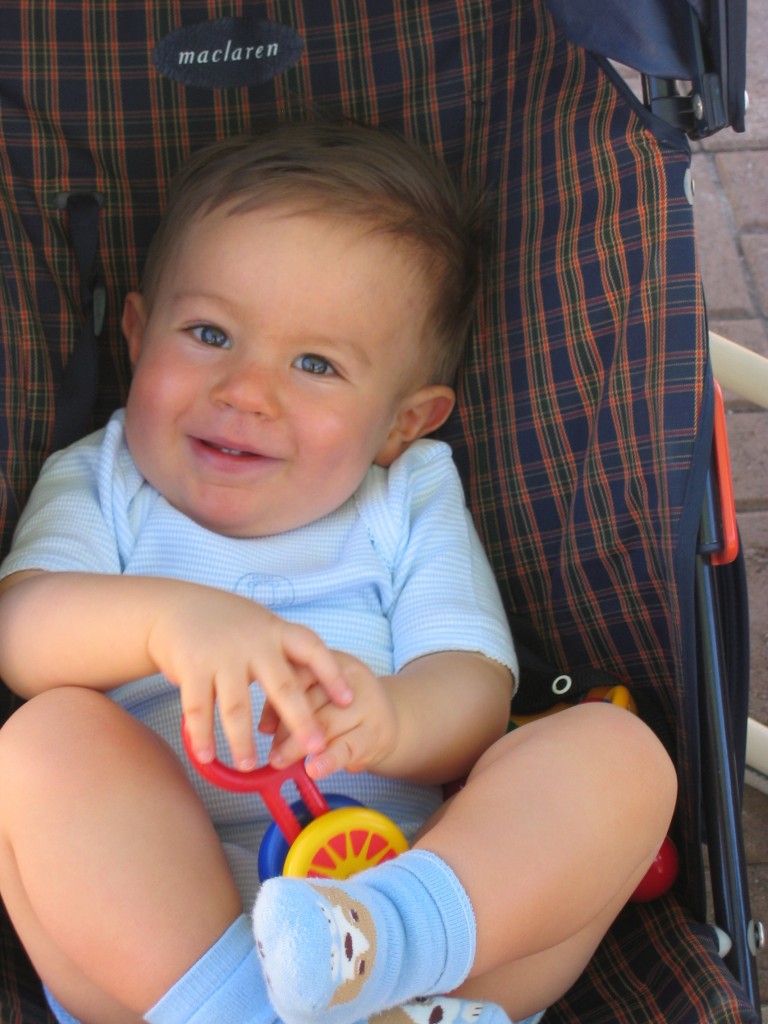
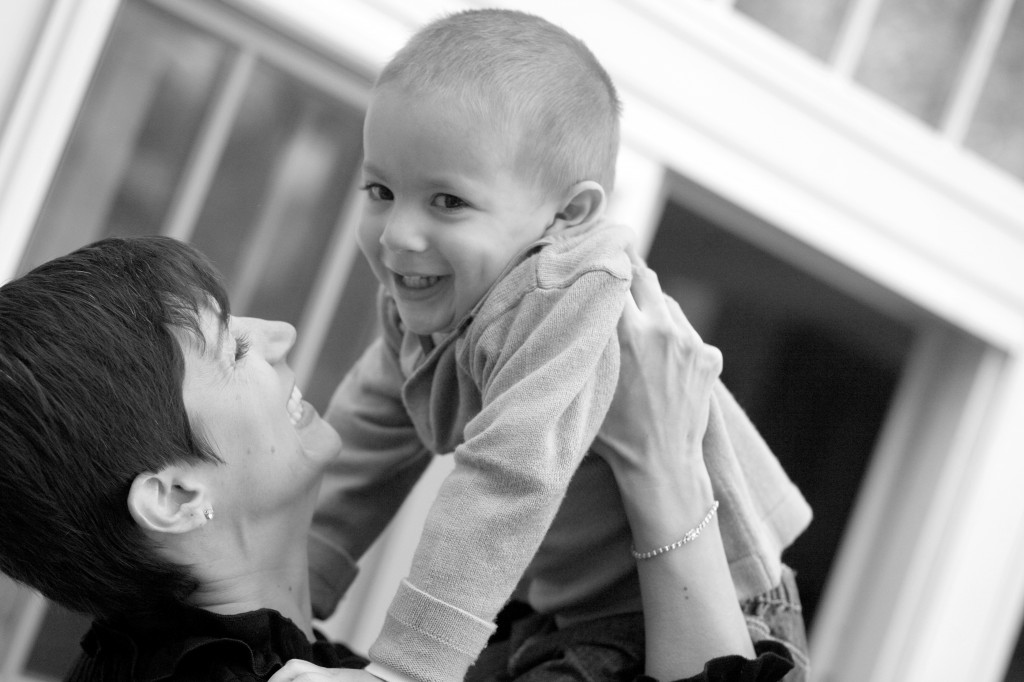
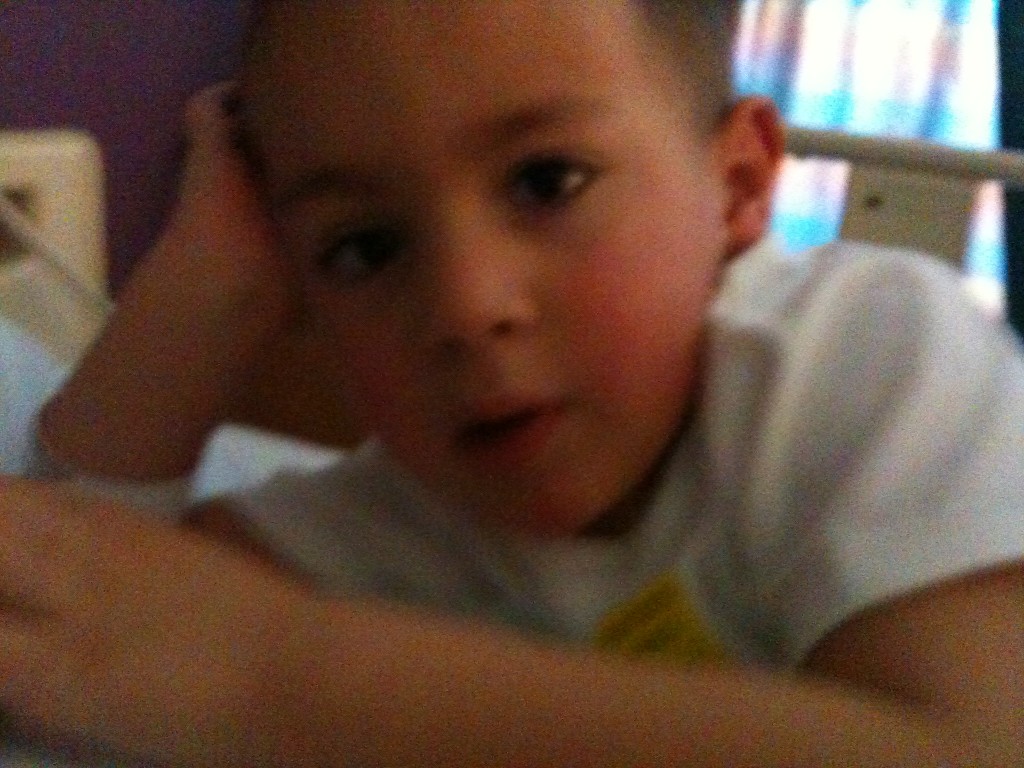
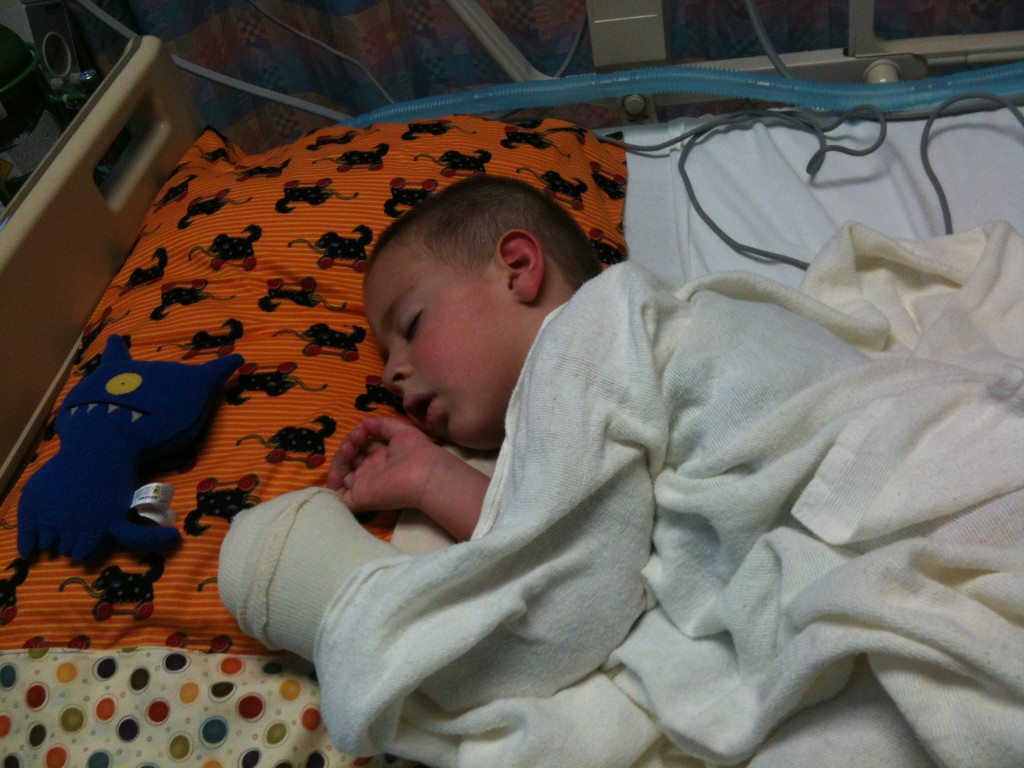
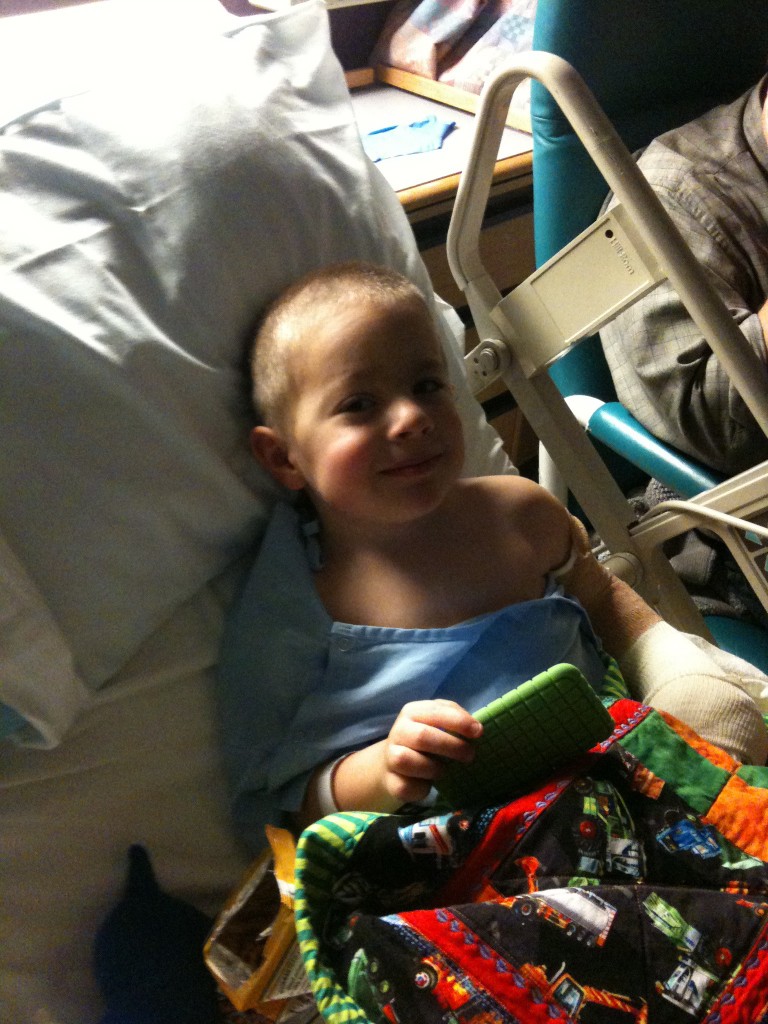
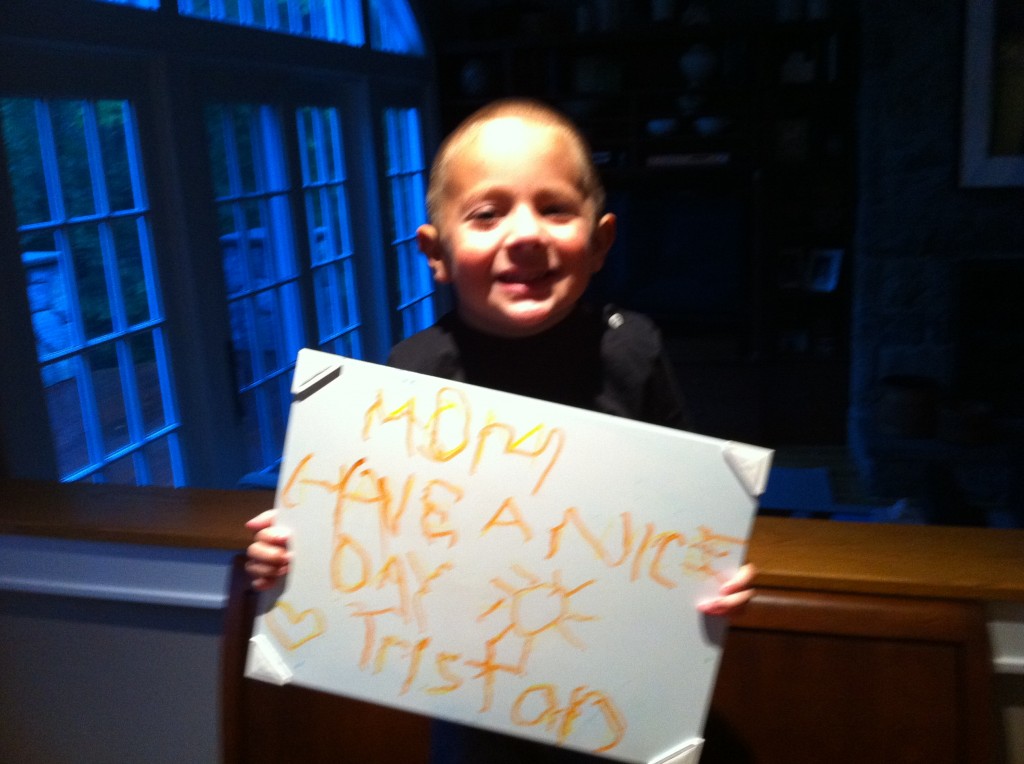
 Link to Twitter
Link to Twitter